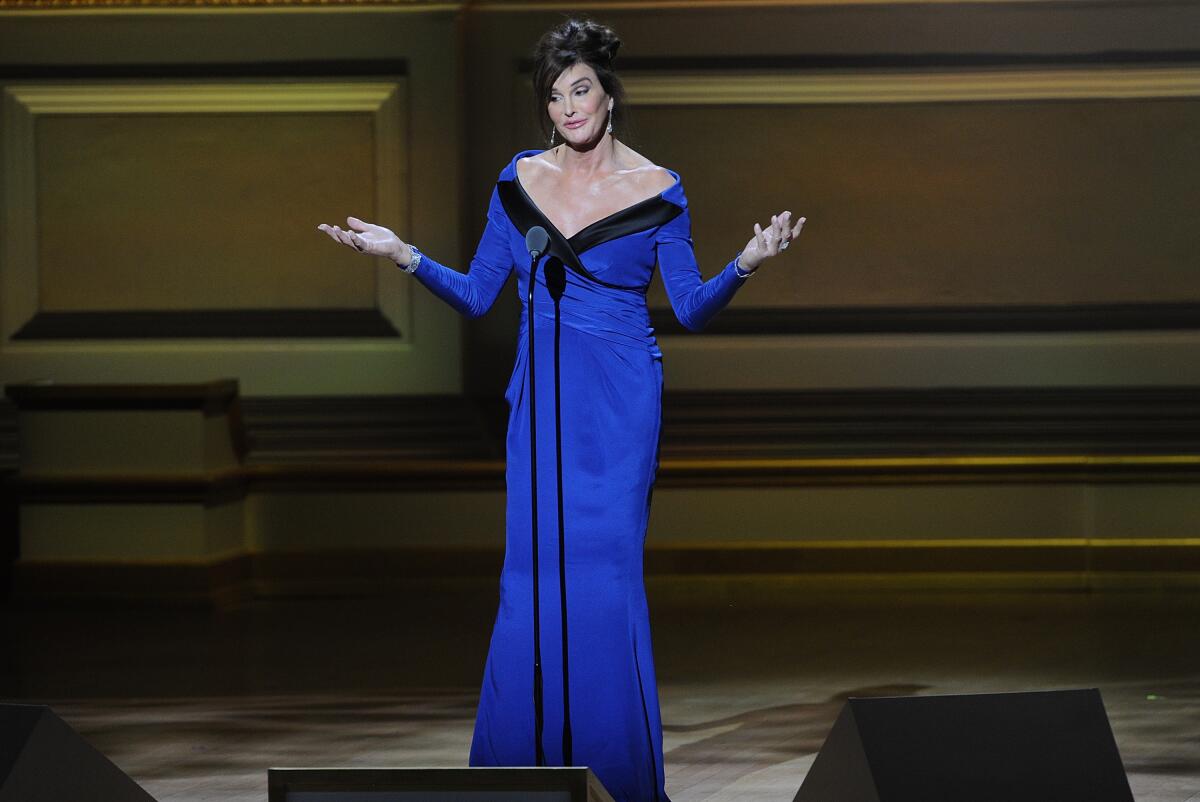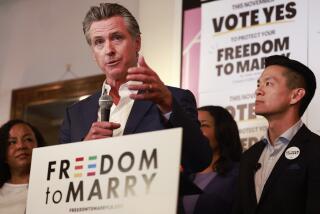Column: Caitlyn Jenner for governor of California? What a terrible idea

What on Earth makes Caitlyn Jenner believe she’s qualified to be governor of California?
She’s an Olympic gold-medal-winning decathlete, a former spokesperson for Wheaties; she posed for the cover of Playgirl magazine, has appeared in all sorts of TV shows including “Keeping Up With the Kardashians,” and is an activist on behalf of transgender rights.
That’s a lot of stuff for one person’s resume. But nothing on it screams out “Gov. Jenner.” She has no electoral or policymaking experience. Call me narrow-minded, but neither throwing javelins nor peddling breakfast cereal is meaningful preparation for running post-COVID California.
Nevertheless, when Axios reported earlier this month that Jenner was exploring a run to replace Gov. Gavin Newsom (assuming the recall election moves forward), her candidacy was taken seriously by a number of political professionals — simply because she’s really, really famous. “I think she’d be a formidable candidate,” said former GOP Rep. Mimi Walters. Former GOP Chairman Jim Brulte called her “viable.”
Now I’d like to tell you that Walters and Brulte are wrong and that California voters are too smart to elect a manifestly unqualified novice to such a complex and critically important job. But history tells us they’re not.
It was back in 1963 that this state basically invented the celebrity candidate when George Murphy, a star of more than 40 Hollywood musicals (and a longtime Republican), announced he would run for the U.S. Senate. Many Californians “scoffed,” said The Times, but Murphy’s researchers determined that his background as a “good guy” in the movies was an asset. He won, leading satirist Tom Lehrer to memorialize the event: “Now that he’s a senator he’s really got the chance / to give the public a song and dance,” sang Lehrer.
A couple of years later Ronald Reagan challenged incumbent Gov. Pat Brown.
Brown seemed to think Reagan could be dismissed as a lightweight, B-movie actor. On the campaign trail, Brown liked to tell crowds that he’d been solving California’s problems back when Reagan was making “Bedtime for Bonzo,” in which his co-star was a chimpanzee.
But Brown’s quips didn’t persuade voters, and Reagan — whose political resume consisted of one effective speech for Barry Goldwater’s 1964 presidential campaign and a few years as head of the Screen Actors Guild — was elected governor.
And with that, California was off to the races. Clint Eastwood used the slogan “Go Ahead, Make Me Mayor” to win election in Carmel-by-the-Sea. Sonny, of Sonny and Cher, went to Congress. (“That little twit gets on television for free,” complained one opponent when Bono ran for mayor of Palm Springs.)
Other stars have won, and some, including Shirley Temple Black, have lost (even though she played “On the Good Ship Lollipop” at her rallies when she ran for a seat in the House of Representatives). Finally, in 2003, California elected Arnold Schwarzenegger governor with less than 50% of the vote in a 135-way recall election. He’d never held public office.
And celebrities were elected elsewhere too. New Jersey sent Bill Bradley to the U.S. Senate on the basis of, I guess, averaging 12.4 points per game for the Knicks between 1967 and 1977. Minnesota elected wrestler Jesse “The Body” Ventura on the irrefutable argument that he didn’t represent “politics as usual.” And now Matthew McConaughey says he is seriously considering a run for governor of Texas (even though he won’t say what party he identifies with).
Not that celebrities always do a bad job. As president, Reagan led an effective administration and was beloved by many (and despised by others). And Californians could’ve picked worse than Schwarzenegger from those 135 candidates.
But that was more luck than intelligent decision-making.
So what does Caitlyn Jenner bring to the job beyond her javelin skills? Her 10.8 million Instagram followers and her 3.5 million followers on Twitter. Her political base.
I want to emphasize that I have nothing against her. She may be a lovely, thoughtful, well-intentioned and competent person. I just don’t think that a person ought to be elected governor of 40 million Californians without so much as having run for the local school board or sat on a neighborhood council.
Why do otherwise unqualified celebrities win so many elections? Name recognition certainly gives them a starting advantage. As does money. And voters have a weird preference for “outsiders” over candidates who — gasp! — have spent their careers working in politics and policy. (Although if they want non-politicians, why don’t voters turn to judges, scientists or diplomats — outsiders with expertise?)
And people feel a deep emotional connection to celebrities. We conflate them with their onscreen or professional personas. We believe Schwarzenegger is tough and determined, Tom Hanks is warm-hearted, Oprah Winfrey is forthright. We think we know them, but we don’t. We imbue them with qualities that have been created on the screen, in the writers room, on Instagram and at public relations agencies. Basically, we’re fooled.
Last year, “The Daily Show” and the marketing firm YouGov asked Americans which celebrity they would like to see as president after Donald Trump. The answer: Morgan Freeman.
Fine. I get that impulse. But is it rational? And does it mean we should vote him in?
Didn’t we learn anything when we turned over the nation’s leadership to an unqualified and incurious reality TV host who neither understood nor cared how government worked?
Probably not.
More to Read
A cure for the common opinion
Get thought-provoking perspectives with our weekly newsletter.
You may occasionally receive promotional content from the Los Angeles Times.











